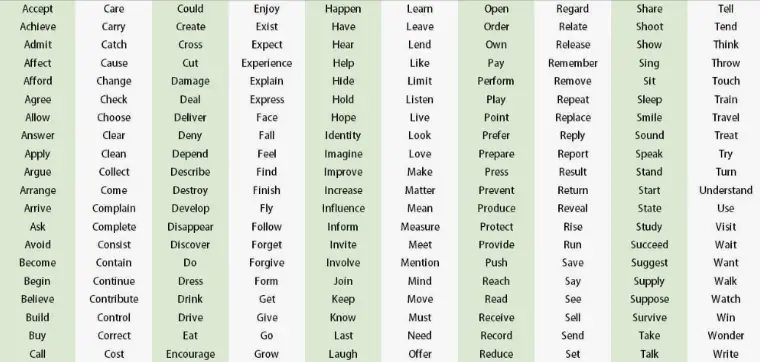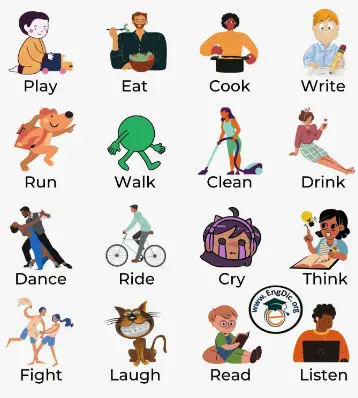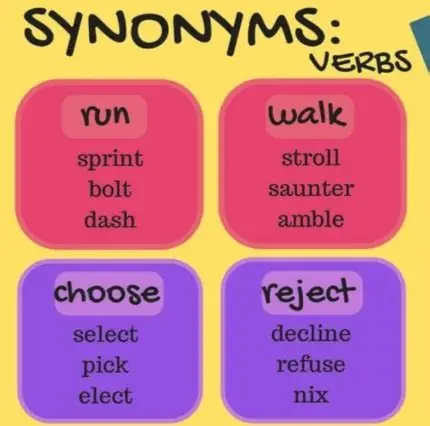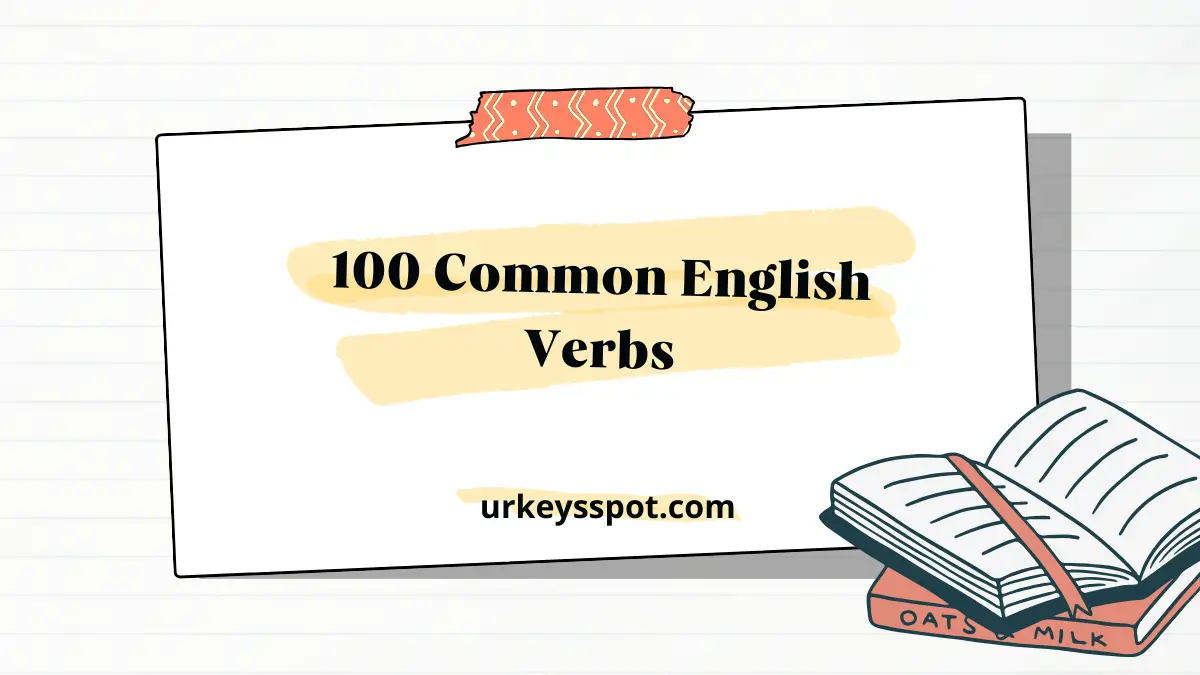In this comprehensive guide, we’ll embark on a linguistic journey through the realm of verbs, the backbone of English sentences. Verbs aren’t just words; they’re the action stars and mood setters of language, painting vivid pictures of what’s happening or conveying states of being. Whether you’re a language learner aiming to sharpen your skills or a word enthusiast curious about English’s verbal landscape, this article is your ticket to a deeper understanding of these pivotal words. We’ll explore the essence of verbs, showcase the most common ones, and provide practical insights into their usage, all while keeping our prose lively and reader-friendly. So, let’s dive into the vibrant world of verbs and enhance our communication prowess.
Introduction to Common English Verbs

Verbs are the dynamo of sentences, propelling the action forward and illuminating the scene. They’re not just mere words; they’re the pulse of our conversations and writings, infusing them with energy and clarity. Understanding verbs is akin to mastering the secret code of effective communication.
In this article, we’re zeroing in on the 100 common English verbs—those linguistic workhorses that carry the brunt of our daily discourse. We’ll not only list them but also sprinkle our discussion with examples, offering you a panoramic view of their versatility. Whether you’re penning a novel, engaging in banter, or crafting an email, these verbs are your faithful allies, ready to lend nuance and precision to your sentences.
Gain a broader perspective on how verbs shape our communication by exploring the Corpus of Contemporary American English. This resource provides a rich context for understanding how common English verbs are used in various texts and dialogues, enhancing your grasp of practical language use.
Understanding Verbs
Definition and Importance of Verbs
Let’s kick things off with a simple truth: without verbs, sentences would flop like a fish out of water! Verbs are the engine of a sentence, propelling it with action or painting it with states of being. In the grand tapestry of language, verbs are the threads that provide color and texture, enabling us to narrate, describe, and inquire.
Imagine a world where sentences had no verbs. You’d have a stage full of characters with no script, a canvas with no paint. That’s how pivotal verbs are! They’re not just essential; they’re the very heartbeat of communication, pumping life into our words and thoughts.
Types of Verbs
Diving deeper, verbs are not a one-size-fits-all deal. They come in various flavors, each adding a unique twist to the sentence.
Action Verbs
Think of action verbs as the superheroes of the verb world. They’re all about action, movement, and dynamism. Whether it’s “run,” “jump,” or “think,” these verbs are the ones that get things done, showing what the subject is up to.
Linking Verbs
Now, let’s mosey on over to linking verbs. These verbs are the Zen masters of the verb family, connecting the subject to additional information without breaking a sweat. When you say, “The sky is blue,” “is” links “the sky” to “blue,” creating a state of being rather than action.
Helping (Auxiliary) Verbs
Last but not least, meet the helping verbs, the unsung heroes that lend a hand to the main verbs. In the sentence “She can dance,” “can” is boosting “dance,” adding a layer of possibility or ability.
By getting cozy with these types of verbs, you’re not just learning; you’re unlocking a treasure chest of expressive potential, ready to add depth and clarity to your communication. So, let’s march on, armed with knowledge and ready to explore the rich landscape of common English verbs!
For those eager to delve deeper into the nuances of verb conjugations and master the quirks of irregular verbs, this detailed verb conjugation guide is an invaluable resource, offering insights and examples to enhance your understanding.
The 100 Common English Verbs

Now, let’s roll up our sleeves and delve into the meat of the matter: the 100 common English verbs. These are the verbs that you’ll encounter on a daily basis, the ones that will spice up your sentences and make your language skills shine.
Each verb is a gem, offering a unique way to express action or state. By mastering these verbs, you’re not just expanding your vocabulary; you’re turbocharging your ability to communicate effectively in English.
Let’s explore a few examples from our list:
- Be: The ultimate chameleon, “be” adapts to various contexts, embodying existence or states of being. Whether you’re “being happy” or “being careful,” this verb is your go-to for expressing conditions or identities.
- Have: A powerhouse of a verb, “have” indicates possession, relationships, or characteristics. It’s the glue that holds experiences and possessions together in our language, from “having a party” to “having brown eyes.”
- Do: The doer of the verb world, “do” is all about actions and activities. It’s the verb you rely on when you’re getting things done, whether you’re “doing homework” or “doing a favor.”
- Say: The voice of the verbs, “say” is your pick for expressing speech and communication. It’s the verb that lets your words take flight, whether you’re “saying hello” or “saying a speech.”
- Go: The verb of movement, “go” propels you forward, taking you places both literally and figuratively. From “going home” to “going bananas,” it’s your ticket to motion and change.
And the list goes on, with each verb opening a new doorway to expression. By familiarizing yourself with these verbs, you’re equipping yourself with a toolkit for crafting dynamic, engaging, and nuanced sentences. So, embrace these verbs, experiment with them, and watch as they transform your language skills from good to great!
Verb Usage and Examples
Now that we’re familiar with the 100 common English verbs, let’s put them into action. Understanding how to use these verbs in various tenses and contexts is like having a Swiss Army knife in your language toolkit; it prepares you for a myriad of conversational and writing scenarios.
Using Verbs in Sentences
Verb conjugation might sound like a fancy term, but it’s just the way verbs change to align with different subjects, tenses, and moods. Getting this right is crucial for clear communication. For instance, the verb “to run” can morph into “runs,” “ran,” or “running” depending on the context.
Let’s break it down with examples:
- Present: “I run three miles every morning.”
- Past: “Yesterday, I ran five miles!”
- Continuous: “I am running a marathon this year.”
By tweaking the verb, you provide precise information about when the action is happening and who is doing it, adding clarity and depth to your sentences.
Irregular Verbs and Their Conjugations
Irregular verbs are the rebels of the verb world; they don’t follow the standard rules of conjugation. But fear not, they’re not as daunting as they seem. With practice, you’ll get the hang of them.
For example, consider the verb “to go”:
- Present: “I go to school.”
- Past: “Yesterday, I went to the park.”
- Past Participle: “I have gone to the concert.”
Irregular verbs add flavor and variety to your speech, making it more dynamic and engaging. By mastering these, you’ll not only sound more natural but also gain a deeper appreciation for the intricacies of English.
So, as you continue your journey with English verbs, remember that practice is your best friend. Experiment with different verbs and tenses, and don’t shy away from making mistakes. After all, every error is a step toward mastery in the vibrant world of language.
Expanding Your Verb Knowledge
Embarking on a journey to enhance your verb knowledge not only bolsters your vocabulary but also elevates your ability to articulate thoughts with precision and flair. Let’s delve into the realms beyond the basics, where verbs morph into more intricate forms, adding layers of texture and color to our linguistic expressions.
Beyond the Basics
Phrasal Verbs
Phrasal verbs, the chameleons of the verb world, weave together a verb and a preposition or adverb, creating meanings that are often entirely distinct from their individual components. Grasping phrasal verbs like “give up” or “look forward to” is akin to unlocking a secret code, offering you nuanced ways to convey your thoughts.
Verb Synonyms

Diving into the world of verb synonyms is like exploring a treasure trove of expression. Each synonym carries subtle nuances, enabling you to paint more vivid and precise pictures with your words. For instance, “whisper,” “murmur,” and “mutter” all imply speaking softly, but each evokes a slightly different image and context.
Common Mistakes to Avoid
Language is a vast ocean, and even seasoned sailors can sometimes lose their way. Here are some common verb-related pitfalls to steer clear of:
- Tense Confusion: Mixing up tenses can muddle your message. Ensure you’re consistent with the time frame you’re referring to.
- Irregular Verb Errors: Irregular verbs can be tricky. Double-check their forms to avoid common mistakes like “I goed” instead of “I went.”
By broadening your verb repertoire and sidestepping common errors, you’re not just learning; you’re sculpting your language into a more expressive and precise tool. So, continue to explore, experiment, and enjoy the rich tapestry of English verbs, and watch as your communication becomes more vivid and engaging.
To further explore the dynamic world of phrasal verbs and integrate them into your daily language use, visit this comprehensive phrasal verbs list. It’s a treasure trove of examples and usage tips that will expand your verbal prowess.
FAQs
What’s the Difference Between Regular and Irregular Verbs?
Regular verbs are the conformists of the verb world, adopting a predictable pattern when they transform to past tense, typically by adding “-ed.” On the other hand, irregular verbs are the mavericks, changing forms in unique ways that defy the standard rules.
How Can I Improve My Verb Usage in English?
Practice makes perfect! Engage with diverse reading materials, listen to native speakers, and practice writing sentences using different verbs and tenses. Don’t shy away from feedback, as it’s a golden ladder to improvement.
Are Phrasal Verbs Essential in Everyday English?
Absolutely! Phrasal verbs are not just sprinkles on the language cake; they’re a crucial ingredient, adding flavor and authenticity to your conversations and writings in English.
How Many Verbs Should I Learn to Be Fluent?
While there’s no magic number, expanding your verb vocabulary enhances your linguistic fluency. Aim to master the most common verbs and gradually incorporate more to enrich your verbal arsenal.
conclusion
As we draw the curtain on our verb exploration, let’s take a moment to reflect on the journey we’ve embarked upon. We’ve navigated through the bustling streets of verb types, strolled in the gardens of common verbs, and climbed the hills of usage and context. This journey has equipped you with the tools to harness the power of verbs, enabling you to craft sentences with precision, flair, and depth.
Remember, mastering verbs is akin to mastering the art of painting with words. Each verb you learn adds a new shade to your palette, allowing you to paint more vivid and expressive linguistic pictures. Whether you’re conversing with a friend, penning a story, or articulating your thoughts, the verbs at your command will breathe life into your words, transforming simple sentences into captivating narratives.
So, as you continue to tread the path of language learning, carry with you the knowledge and insights you’ve gained. Embrace the challenges, celebrate the milestones, and always keep the flame of curiosity alight. The world of verbs is vast and vibrant, brimming with possibilities and nuances waiting to be explored.
In the end, language is not just about communication; it’s about connection, expression, and the art of weaving thoughts into tapestries of words. With your newfound understanding of verbs, you’re not just a speaker or a writer; you’re an artist. So go forth, wield your verbs with confidence, and paint the world with your words!

